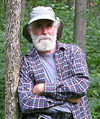Syracuse Views Summer 2025
We want to know how you experience Syracuse University. Take a photo and share it with us. We select photos from a variety of sources. Submit photos of your University experience by sending them directly to Syracuse University News at…

 For his accomplishments in the biological sciences, Starmer, a professor of biology in SU’s
For his accomplishments in the biological sciences, Starmer, a professor of biology in SU’s